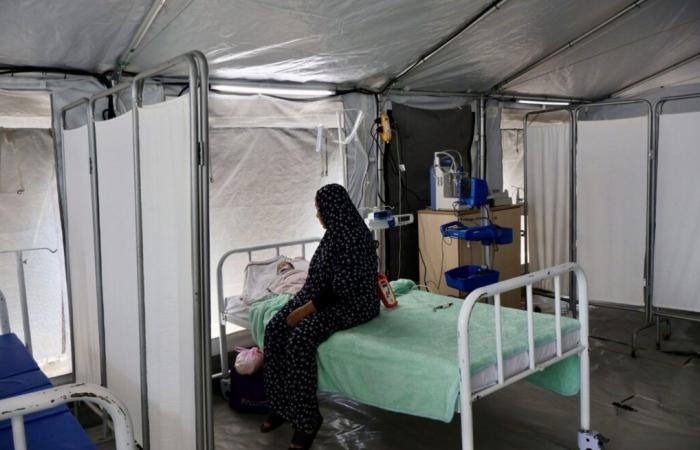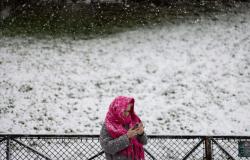More than 15 months after the start of the war, the Gaza Strip is still closed to journalists, independently. Health workers, entering and leaving the besieged territory, are among the few observers who can bear witness to what is happening there. The Dr André Munger, from Rivière-du-Loup, headed the Doctors Without Borders (MSF) France hospital in Deir al-Balah, in the center of the Gaza Strip, for six weeks. Back in Quebec, he recounts what he saw.
From the end of October to the beginning of December, the Dr Munger settled in the so-called “humanitarian” zone, decreed by the Israeli army. A narrow strip of land extending over a few dozen square kilometers, from Deir al-Balah to the north of Rafah, and serving as refuge for tens of thousands of displaced Palestinians.
“There must be around a million of them living in tents or tarpaulins, on the sand, in quite terrible conditions,” reports the doctor. The area is in theory “safe”, that is to say free from Israeli bombings. “But that’s not true. There are some. »
In the fall, MSF France set up a modular hospital in this area, near the Mediterranean Sea. The center, specializing in pediatrics, was built using prefabricated modules from France. “We started in September with a general outpatient clinic, with a dressing room. Afterwards, we were able to open an emergency. »
Operating rooms were put into operation. Three hospitalization rooms, with 18 beds each, have been added. A small laboratory and an x-ray room are also located there. Due to a lack of electricity, the hospital runs on diesel generators. “Before I left, we had reserves for about a month,” testifies Dr.r Munger. There are solar panels too, but it’s not enough. »
Respiratory and skin problems
Hospitalized children mainly suffer from respiratory problems, such as pneumonia and bronchiolitis. “Winter has arrived. The children live in difficult conditions and do not eat enough, so their immune defenses are less good,” explains the family doctor.
At the outpatient clinic, where patients of all ages can come, Dr.r Munger has seen a lot of skin problems, including impetigo and cellulite. “There is a shortage of hygiene products, so children and even adults get sores easily. »
Patients suffering from war injuries were referred to other hospitals. A survey of around sixty health workers who worked in Gaza, published in October in the New York Timesrevealed that these doctors and nurses witnessed a high number of children suffering from gunshot wounds to the head or chest.
“The bombings of the Israeli army are daily,” notes the Dr Munger. [Des soldats au sol] will shoot even in tents or makeshift shelters where people are. » The doctor, who has worked with MSF for around twenty years, also notes that there are “many deaths compared to the wounded” in this armed conflict.
Since the start of the Israeli response to the Hamas attack, more than 46,000 Palestinians have been killed, according to the Hamas Ministry of Health. The terrorist attack, carried out on October 7, 2023 in Israel, caused some 1,200 victims and 251 hostages were taken to Gaza. About a hundred are still there.
Malnutrition and supply
On the road along the Mediterranean coast in the humanitarian zone, the Dr Munger was often caught in congestion. “We can’t go more than 5 or 10 km per hour because there are so many people on the road,” he says. By looking around him, the doctor was able to see “that all the children are thin or really not fat.”
In the clinic, he observed a few cases of moderate malnutrition. “More rarely severe malnutrition. » But with the arrival of winter, coupled with the blocking of humanitarian aid and the exorbitant prices of food in the markets, the doctor fears the worst for these children who are “right on the line”.
Fuel shortages and the difficulty in bringing in medical equipment are also compromising the functioning of hospitals. “The wait is endless. It must pass through Israeli controls. […] And there is a blockade, so there are very few trucks that can enter. » Several shipments are also stolen. “There are shortages of just about everything. »
In addition to physical health problems, there are psychological health problems. “At the beginning, they still had the hope that all this would end fairly quickly with international mediation. » But time passed, their homes were destroyed, many of their relatives were killed and entire areas of the Gaza Strip were emptied of their population.
The Dr Munger and his colleagues were often told: “Why do people in the countries where you live know what is happening to us and let us suffer like this? » he reports. And many ended up telling him: “The word I hate the most, the one I no longer want to hear, is the word “hope”. »






